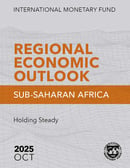This web page provides information on the activities of the Office, views of the IMF staff, and the relations between Central African Republic and the IMF. Additional information can be found on Central African Republic and IMF country page, including official IMF reports and Executive Board documents in English and French related to Central African Republic.
At a Glance
- Current IMF membership: 191 countries
- Central African Republic joined the Fund in July 10, 1963.
- Quota (SDR): 111.4 million
- Outstanding Purchases and Loans (SDR): 227.87 million (September 30, 2025)
- Last Article IV Consultation : Country Report No. 2023/155; May 2, 2023
Office Activities
Job posting / description on this PDF .
October 30, 2025
Joined Press Conference Following the Conclusion of the ECF Sixth Review Mission (français)
On May 3, 2019 the Minister of Finance and the IMF team organized a press conference following the conclusion of the ECF 6th review mission (video in French).
May 16, 2019
H. E. President Touadera meets with IMF Managing Director Madame Lagarde
C.A.R. medias report on President Touadera’ April 2019 visit to Washington DC during which he met the IMF Managing Director Madame Lagarde (in French).
April 30, 2019
Participation at a Session of the Economic and Social Council (Conseil Economique et Social)
On February 5, the IMF Resident Representative was invited to moderate a session of the Social and Economic Council and presented the role of the Fund and status of implementation of the ECF supported program in C.A.R.
February 28, 2019
Governmental Seminar on C.A.R. Macroeconomic Situation
The IMF C.A.R. office jointly with the Ministry of Finance organized a governmental seminar on the macroeconomic situation on C.A.R. and prospects. The seminar was attended by twelve ministers. The IMF team presented the conclusions on the main Article IV consultation themes on revenue mobilization, good governance, the business environment, and gender equality.
November 30, 2018
Central African Republic and the IMF
No results found. Either there was an error with the web service or there is no data returned by the web service.
Regional Economic Outlook
October 16, 2025

The outlook for Sub-Saharan Africa is showing resilience, despite a challenging external environment with uneven prospects in commodity prices, still tight borrowing conditions, and a deterioration of the global trade and aid landscape.
Read the Report
Fraudulent Scam Emails Using the Name of the IMF
For more information please see Fraudulent Scam Emails Using the Name of the IMF



